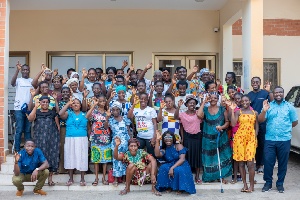Regional News of Tuesday, 25 March 2025
Source: www.ghanawebbers.com
Waste workers in La Dade Kotopon and Ledzokuku trained to tackle methane emissions and air pollution
Waste workers in La Dade Kotopon and Ledzokuku have received important training. This initiative is funded by the Clean Air Fund and Global Methane Hub. The program aims to help these workers reduce methane emissions and improve air quality.
Methane is a powerful greenhouse gas. It contributes significantly to climate change. The United Nations Environment Programme (UNEP) states that methane warms the planet over 80 times more than carbon dioxide in 20 years.
In Ghana, landfill sites and poor waste management increase methane emissions. The Environmental Protection Agency (EPA) identifies waste mismanagement as a major cause of urban air pollution. This leads to health risks like respiratory diseases.
A report from the Climate and Clean Air Coalition shows that better waste management can cut methane emissions. Practices like organic waste separation, composting, and capturing landfill methane are effective. However, lack of awareness and infrastructure slows progress in Ghana.
Mabel Naa Amorkor Laryea from the Green Africa Youth Organization (GAYO) spoke about the program's importance. She said waste workers are key agents against air pollution and climate change. They deal with waste daily, making them crucial for reducing methane emissions.
The training covered several areas:
1. Understanding how waste management affects air quality.
2. Identifying organic waste as a source of methane.
3. Teaching practical strategies for household waste segregation.
4. Ensuring worker safety from harmful gases.
5. Empowering workers to educate their communities about clean air.
Waste segregation at the source is vital for reducing methane emissions. A World Bank study found that organic waste makes up over 50% of municipal solid waste in developing countries. Improper disposal leads to significant methane production.
Laryea noted that many households lack awareness about this issue. Mixing organic waste with plastics causes it to decompose anaerobically in landfills, producing large amounts of methane. By separating organic waste for composting, we can greatly reduce these emissions.
The Green Africa Youth Organization has trained over 600 waste workers in La Dade Kotopon and Ledzokuku. These workers will educate community members on separating organic from general waste.
Laryea emphasized that change takes time but can be impactful with consistency. Waste workers can connect environmental organizations with local communities effectively.
This initiative supports global efforts against climate change while improving urban air quality. Reducing methane emissions can quickly benefit both climate mitigation and public health.
As Ghana faces ongoing air pollution challenges, educating and empowering waste workers is essential for a cleaner future. With support from the Clean Air Fund and Global Methane Hub, this initiative sets an example for community-driven environmental action—showing that small grassroots changes can lead to significant climate solutions.











